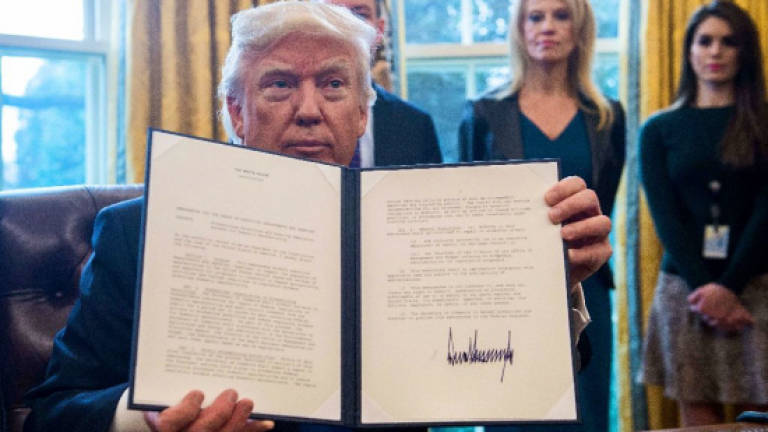Trump revives controversial oil pipeline projects

WASHINGTON: US President Donald Trump on Tuesday revived two oil pipeline projects blocked by his predecessor on environmental grounds, signalling his determination to undo Barack Obama's legacy.
Trump gave a conditional go-ahead to the Keystone XL pipeline – which would carry oil from Canadian tar sands to US refineries on the Gulf Coast – and an equally controversial pipeline crossing in North Dakota.
Both had been put on hold by president Barack Obama's administration on environmental grounds.
Since being sworn in on Friday Trump has begun rolling out an orthodox Republican agenda.
He has moved to curb funding for abortions, embraced Israel, frozen government hiring and sought to loosen environmental regulations.
His administration has also sought to place a tighter grip on departments that may not be sympathetic to his politics.
On day one, his Interior Department ordered staff to report any correspondence from Congress, governors, environmental groups or industry organizations, according to an internal memo obtained by AFP.
Certain meetings, regulations and environmental notices are also to be reported to the department's executive secretariat.
"No correspondence should be cleared to go to Congress or to any Governor until it has been reviewed by the Acting Chief of Staff and/or Senior White House Advisor," the document states.
Trump has also bucked orthodoxy and sought to put his nationalist and populist print on policy, especially on the economy and trade.
True to his claim to be a hard-charging dealmaker, Trump said both pipeline projects would only be built subject to renegotiated terms and conditions.
"It is subject to a renegotiation of terms, by us," Trump said. "We are going to renegotiate some of the terms and, if they like, we'll see if we can get that pipeline built."
Made in USA
The freshly minted president indicated that one possible focus of the renegotiation could be who makes the actual piping.
In a separate executive order issued Tuesday, Trump decreed that pipes should be American made – echoing his "America First" doctrine.
"I am very insistent that if we are going to build pipelines in the United States the pipes should be made in the United States," Trump said.
"We want to build the pipe, put a lot of steel workers back to work."
Most, although not all, oil pipelines are buried underground and made of carbon steel.
Obama had rejected a permit from Calgary-based firm TransCanada to build the 1,900km Alberta-Nebraska section of the project.
Environmentalists have assailed the project, arguing that the Alberta deposits produce some of the "dirtiest" crude in the world.
The Canadian government led by Prime Minister Justin Trudeau has cautiously supported the plan, seeing it as a means of boosting business.
But Canada's liberal leader has also helped lead the international charge against climate warming.
Ahead of Trump's announcement, natural resources minister James Carr said the move would be "very positive for Canada," creating 4,500 construction jobs.
"We believe that it's a good project for both Canada and the United States and we're very hopeful."
Dakota chill
The Dakota Access Pipeline is more of a political hot potato in the United States.
Native Americans and their supporters strongly protested against the project, prompting the US Army Corps of engineers – which has approval authority – to nix the plans under the Obama administration.
Thousands of protesters had camped in freezing winter temperatures to block the pipeline's planned route which the Standing Rock Sioux Tribe says creates a risk of water pollution and endangers areas with sacred historic artifacts.
The standoff – which included some 2,000 military veterans who joined the protest – set off violent clashes with law enforcement as well as sympathetic demonstrations nationwide.
But Trump has supported the 1,886km oil pipeline, which would snake through four US states.
Environmental groups vowed to fight the pipeline in court and the Standing Rock Sioux Tribe accused Trump of violating treaty rights.
"We are not opposed to energy independence. We are opposed to reckless and politically motivated development projects ... that ignore our treaty rights and risk our water," said Dave Archambault, chairman of the group. — AFP